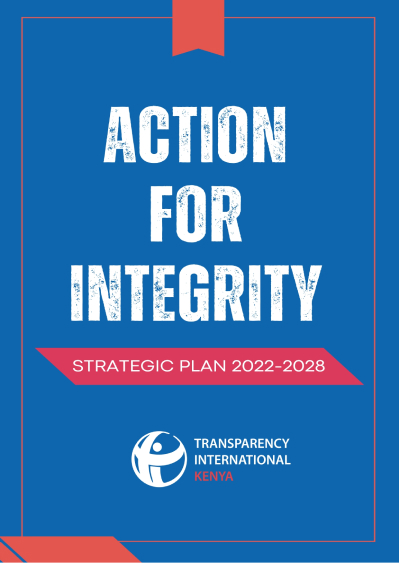As we commemorate International Anti-corruption Day on the 9th of December 2023, the world is called upon to unite in the fight against corruption and state parties to the United Nations Convention Against Corruption (UNCAC) which was enacted 20 years ago, to examine the remaining gaps that require attention to ensure that it continues to strengthen anti-corruption efforts in the years ahead.
Kenya as the first state to ratify UNCAC in 2003, has made significant strides in enacting laws and anti-corruption legislative frameworks, but the laws are yet to significantly turn the tide against corruption in the country.
One of the most imperative provisions of UNCAC is Article 8 on the code of conduct for public officials. It specifically outlines the obligations of state parties to promote, inter alia, integrity, honesty, and responsibility of its public officials. To support its implementation, the Constitution of Kenya provides the normative framework for good governance and an ethical society. Articles 10, 73, 74, 75 and 232 of the Constitution set out the Principles of Governance and National Values which bind all state organs, State and Public Officers. In essence, these provisions of the Constitution encompass everything that is required to set, maintain or raise the standards in the management of public affairs. Chapter Six of the Constitution specifically outlines the guiding principles of leadership and integrity which include selfless service based solely on the public interest, demonstrated by honesty in the execution of public duties. Article 79 of the Constitution, mandates the Ethics and Anti-Corruption Commission (EACC) to oversee and enforce the implementation of Chapter Six. This chapter, read with Section 4(2) of the Leadership and Integrity Act (LIA) 2012, is designed to ensure the highest standards of integrity among public officers. Further, the Public Officer Ethics Act (POEA), 2003; Public Officer Ethics Regulations, 2003; the Acts on Anti-Corruption and Economic Crimes; Proceeds of Crime and Anti-money Laundering; Bribery; Anti-Corruption Commission, and various other accountability laws such as the Access to Information, public procurement and public finance management laws are all geared towards fortifying Article 8 of UNCAC. Despite all these lofty aspirations, Kenya is still grappling with ethical leadership, demonstrated by the continued election and appointment of individuals accused of corruption and other economic crimes to public office, ultimately undermining the very essence of the UNCAC and eroding public trust in leadership.
To truly honor the commitments under Article 8 of UNCAC made two decades ago, Kenya must intensify efforts to bridge the gap between legislative intent and practical implementation. First, there is an urgent need for comprehensive electoral reforms that include the establishment of rigorous electoral vetting processes that scrutinise the backgrounds of candidates for public office, ensuring that individuals facing corruption allegations or with questionable ethical standing do not ascend to public office. This approach aligns with the principles of Article 8 in UNCAC on emphasising the promotion of integrity and responsibility among public officials.
Furthermore, investing in continuous ethics concientisation for public officials is crucial and mandatory, to inculcate the principles outlined under UNCAC Article 8. Such programmes should emphasise the importance of upholding integrity, honesty, and responsibility in the execution of public duties. The concientisation efforts should not only focus on legal obligations but also cultivate a strong ethical mindset, ensuring that public officials understand the profound impact their actions have on public trust and national development.
Kenyans must also embrace a culture of zero tolerance for unethical conduct because just like seeds germinate and thrive under healthy and fertile soils, good laws will also thrive better when anchored on strong values founded on sound ethical systems.
As a country, we have successfully tackled other challenges as a united front, and the battle against corruption should be no exception. To fulfill the commitments under Article 8 of UNCAC, and we must rally together with the same tenacity and unity of purpose that has characterised our victories in the past. It is time to translate words into action, holding ourselves accountable to the principles of integrity, honesty, and responsibility as outlined in the Convention. Only through a concerted and sustained effort can we hope to build a nation where corruption finds no refuge, and the ideals of good governance prevail.
By Sheila Masinde – Executive Director, Transparency International Kenya | smasinde@tikenya.org


